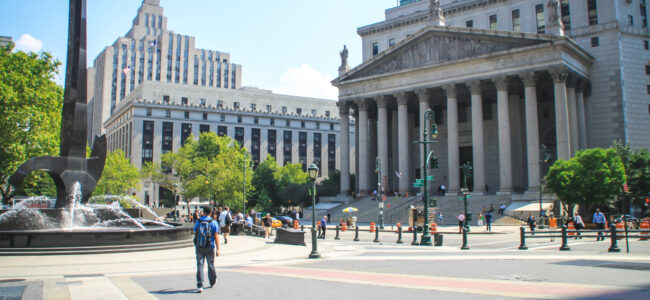BlogLine
U.S. Supreme Court Addresses Parameters of Free Speech
5/3/22

By: Doug Holthus
On May 2, 2022, the United States Supreme Court announced its decision in Shurtleff v. City of Boston, et al., 596 U.S. _ (2022). The primary issue presented: the parameters of freedom of speech.
The City of Boston, MA has a tradition. For many years, a flagpole erected outside of Boston’s City Hall has been used by various private groups accommodating requests to raise flags of the groups’ choosing, with prior approval of the City.
In Shurtleff, a group known as “Camp Constitution” requested the City’s approval to raise and fly a Christian flag in order to “commemorate the civic and social contributions of the Christian community.” The City’s Commissioner for the Department of Property Management declined the request. Upon review by way of a writ of certiorari, the Court found a violation of the group’s First Amendment right guaranteeing free speech. The Court reasoned that through its practice, the City was not promoting any speech inasmuch as the evidence showed the City was not controlling the various flag raisings nor “shaping” any individual flag’s particular message. Indeed, the Court carefully considered the fact that the City “told the public that it sought ‘to accommodate all applicants’ who wished to hold events at Boston’s ‘public forums,’ including on City Hall Plaza, that the City’s application form “asked only for contact information and a brief description of the event, with proposed dates and times,” and that “the city employee who handled applications testified by deposition that he had previously ‘never requested to review a flag or requested changes to a flag in connection with approval…’”
The Court ultimately determined that “(A)ll told, while the historical practice of flag flying at government buildings favors Boston, the City’s lack of meaningful involvement in the selection of flags or the crafting of their messages leads us to classify the flag raisings as private, not government, speech—though nothing prevents Boston from changing its policies going forward.”
As noted by the Court, “When the government encourages diverse expression— say, by creating a forum for debate—the First Amendment prevents it from discriminating against speakers based on their viewpoint…But when the government speaks for itself, the First Amendment does not demand airtime for all views. After all, the government must be able to ‘promote a program’ or ‘espouse a policy’ in order to function…The line between a forum for private expression and the government’s own speech is important, but not always clear.”
For further information or inquiries please contact Doug Holthus at doug.holthus@fmglaw.com.
Share
Save Print